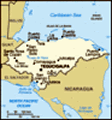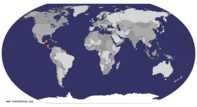Advertisement
Published: February 19th 2010
A one hour cab ride, I was left at the central town park in Cofradía. It was hot, maybe 85. The cabbie really didn't want to leave me alone, and seemed worried. I said I would be OK. A small girl approached, asking, "Blah blah blah blah Maureen?" Obviously the answer to that question is “Si!” She walked me across the square to a sewing shop. Her mother gave me a drink and called someone who called someone who called Maureen, who was just about to leave for the airport. We unraveled the miscommunication about my arrival time. She greeted me in ten minutes; the trip begins.
The map summarizes our route in town. Regrets, I cannot show labels for points on the route. We actually wandered more than shown. From the square, we stopped for a limonada (not shown), and then walked to Carla’s home for a baleada. Then to Maureen's house, to the apartment of the other teachers (not shown), and then to Jose's for dinner.
Travel is about food.
We usually ate “tipico”, that is, local cuisine, which is cheap and healthy. Baleadas are one of Honduras’s most original and
popular foods. The basics are wheat tortillas, fresh, thick and large, folded to contain refritos (= mashed pinto beans), topped with queso (= slices of Mexican style white hard cheese, feta in appearance but less sharp) and/or mantequilla (often translated as “butter,” we would recognize it as white creamy lard). To this basic no frills version add ingredients for a real meal. The first level is scrambled eggs and chimol (diced tomato, onion, and bell pepper). Carla operated a two table café on her veranda. She made the best baleadas in town, adding avocado, plantain, and salsa. So good because so fresh, hot off the wood burning stove. On the side a four gallon iron cauldron simmered with pinto beans. I had no lemps (Honduran currency formally called “lempiras”) and Maureen was broke so we just said we would pay her mañana. Maureen’s friends make a (local?) alternative snack of tortillas, plantains, and mantequilla they called a “carburetor” (= all carbs).
While we’re at it, desayauno = breakfast tipico is eggs scram or omelet, with sides of ham or chorizo, queso or mantequilla, frijoles, tortillas, fried plantains, and coffee. In nicer cafes this would be garnished with a small
bowl of chopped watermelon, pineapple, and papaya. Cost is $3, extra for espresso when you can get it. Or Mayan coffee (laced with chili peppers, not recommended). In Antigua we added puncho de fruita, a delicious Christmas (holiday?) hot drink thick with chopped fruit, cinnamon stick, clove, nutmeg.
And for almuerzo = a simple lunch tipico might be rice, beans, and chicken thigh for $2. The lunch shown is more of a full meal for $5. I once ordered “orange drink” and got Tang. And then I worried whether, or not, it was made with purified water. Even locals have to drink purified water now. No liquor laws, so beer is usually available anywhere and sometimes hard drinks. Locals generally don’t eat dinner, not surprising, but if they did it was pretty much lunch fare. Gringo cuisine available in nicer restaurants. I never liked their ice cream or pastries. They looked great but had too much sugar and too few eggs. I mostly ate just two meals a day and not surprisingly gained ten pounds. A third meal was morning cappuccino, afternoon limonada, or evening tequila shot(s).
Talkin' politics
That evening Maureen's host family─where she had

 Maureen's patio
Maureen's patio
See outside shower in the backgroundstayed her first month─ invited us to dinner. I did not know it at the time, but they really wanted to meet me. Not to meet me as an individual, but so they could finally meet Maureen. In Latin American you have not really met someone until you have met their family, especially their parents. They have a large, nice home with a corrugated metal roof like everyone else. The father is a lawyer who works in San P. Jose had asked me if I would like a beer. The mother invited me into her kitchen and soon had me making tortillas. Or at least shaping the already prepared dough to be placed in the tortilla press. Great fun. I would have engaged mother more if I had known their customs. A woman prepares the table, prepares and serves dinner, and then waits in the doorway like a servant, coming to the table only to bring more food or to take away dishes. After dinner is over she can watch. This is only slightly over-stated. Each time I experienced this I felt more angry, more judgmental about it. As if the roles for women in America are so wonderful. Juan
returned from the store with the beer. Four six packs of different brands. Such a gracious host. We retired to the living room and, be still my heart, talked politics.
I knew some of the context. Honduras is poor, with less than half the per capita income of Belize or Turkmenistan, lower than Palestine but higher than Bolivia or Sudan. Guatemala is higher than Honduras but closer to Belize, yet below Paraguay. (National average data from the World Bank.) More important than average income is the ratio of the top 10% to the bottom 10%. In Honduras the top 10% earn 34 times the bottom. Guatemala’s ratio is 48. By comparison, the US is 16. Most of the wealth in Honduras is controlled by six families. (Common knowledge data from Jose.)
Last year, Honduras was the little country that defied the world. Now it is the graveyard of both Latin American diplomacy and of Barack Obama’s attempt at a friendly fresh start with the neighbors. The turnout was roughly the same as when Zelaya was narrowly elected ahead of Porfirio "Pepe" Lobo five years ago. This time, Lobo won and everyone lost. Chavez lost his attempt to establish
a beachhead in Central America. At the time, Zelaya was still holed up in the Brazilian embassy. Brazil failed to re-instate him and defaulted on their promise never to intervene in internal affairs. On January 27th Lobo was sworn in to take over a country that is diplomatically isolated, economically battered and socially and politically polarized. Because of the world recession, the aid cut and the collapse in confidence triggered by the coup, the economy last year shrank by 4% and counting. Public debt and the fiscal deficit have ballooned. The key fact, never reported, is that Zelaya (the ousted president), Micheletti (his replacement) and Lobo (the newly elected president) all come from three of the six elite families. No wonder the people do not really care about elections; it is a one party system. The only winner is the families and all they won is the status quo. Why? How?
I am forever grateful to Maureen for graciously translating a full half hour of complicated thought. I started indirectly, about “the political situation.” I had read the New York Times reports of tactics of power players, who domestically are political leaders (who represent the families and their business
interests) and their institutional servants (government, military, press) and who externally are foreign countries and international financial institutions. Juan spoke passionately about all of the ways in which both sides (Zelaya and Michelletti) were legally correct and legally incorrect. Clearly, for him, a trained attorney, there was only one correct side, the constitution. Which is where Obama initially positioned himself until, sadly, through Hilary, caving in to the status quo. The problem is that there is some demand for rule of law, but there is no effective demand, that is, no force behind this demand, so that it becomes just wishful thinking.
To put the facts of income inequality in sociological terms, there simply is no middle class qua class. The professional stratum is relatively thin by our standards, but still, why do we see no sign of some intelligentsia to counter the families. His response was a pause, a deep sigh looking down, “They are afraid.” The answer is so simple: political organizers are simply shot. The motive for this “crime” can always be explained by charges of theft or whatever, when really it is an expression of the power struggles of family feuds. Executioners are rarely caught.
Sadly, this earnest and passionate lawyer would never become the Honduran Bobby Kennedy able to trap their equivalent of the Mafia La Familia with charges of wiretapping or tax evasion. The police and the military protect the system, in this case a clan system, not a constitutionally based system. Instead of being the intelligentsia, the intelligent are fearful and silent.
Maureen was tired and dinner was ready. I was already full.
Advertisement
Tot: 0.111s; Tpl: 0.015s; cc: 9; qc: 53; dbt: 0.0462s; 1; m:domysql w:travelblog (10.17.0.13); sld: 2;
; mem: 1.2mb











Marcia
non-member comment
It's good to be reminded that, despite our many many flaws, we are lucky to be Americans--unlikely to be shot for opposing one power or another.